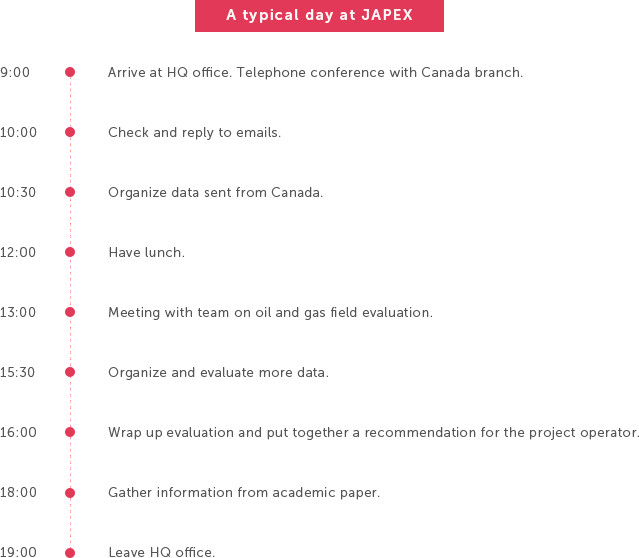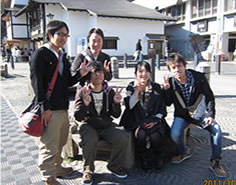

Common belief is that petroleum engineers have all studied Geology or Reservoir Engineering. That is not the case with JAPEX. In fact, I studied neither while I was at university. My research subject was “the monitoring method of the dispersal of pollen”. However, after I entered JAPEX, I was given an opportunity to study technology regarding oil recovery. Now, I belong to the Canada LNG Project Department, where I am involved in shale gas production.
Why did I enter JAPEX? That is because I found oil and gas exploration very interesting. When I was job hunting, I actively attended JAPEX’s introduction seminars, regardless of my technical background. As I got to know a lot of different companies from different industries, I came across JAPEX.

My job is to evaluate the shale gas fields in western Canada, in which JAPEX has a non-operator interest. I must find out how much natural gas will be produced from those fields, and for how long. This is done by looking at the current production trends of each well. We make a graph using production data given from the operator of the project, and data from the local JAPEX subsidiary. The graph enables me to determine which areas have a high rate of production, and hence plays an important role in evaluating the amount of recovery possible.
The project I am currently involved in is a large integrated one, spanning from the development/production, liquefaction and export of LNG. I calculate the estimated ultimate recovery and evaluation of productivity, which is an important piece of information that the management uses to make decisions. It is a very challenging job, since my work is reflected on the project’s development plan.

Shale gas and shale oil has just started to fully develop in recent years. Its technological aspect has not yet been established. As a matter of fact, the behavior of shale gas production differs hugely from conventional gas fields.
As a result, new technology and knowledge is needed in all aspects of shale gas- from the evaluation of ultimate recovery to development and production. Preexisting technology and knowledge of reservoirs may not be valid. In fact, it may be said that shale technology is renewed through daily operations.
It is a great opportunity for me, who has no expertise in reservoir engineering. Learning about shale now will enable me to catch up with the veteran professionals. My seniors teach me well, and I am having a really great experience in this project.


 I love travelling and finding good cafes to hang out. I travel once every 2-3 months. My favorite place is the onsen, or hot springs. Also, I like to go to cafes in Tokyo and Chiba.
I love travelling and finding good cafes to hang out. I travel once every 2-3 months. My favorite place is the onsen, or hot springs. Also, I like to go to cafes in Tokyo and Chiba.
